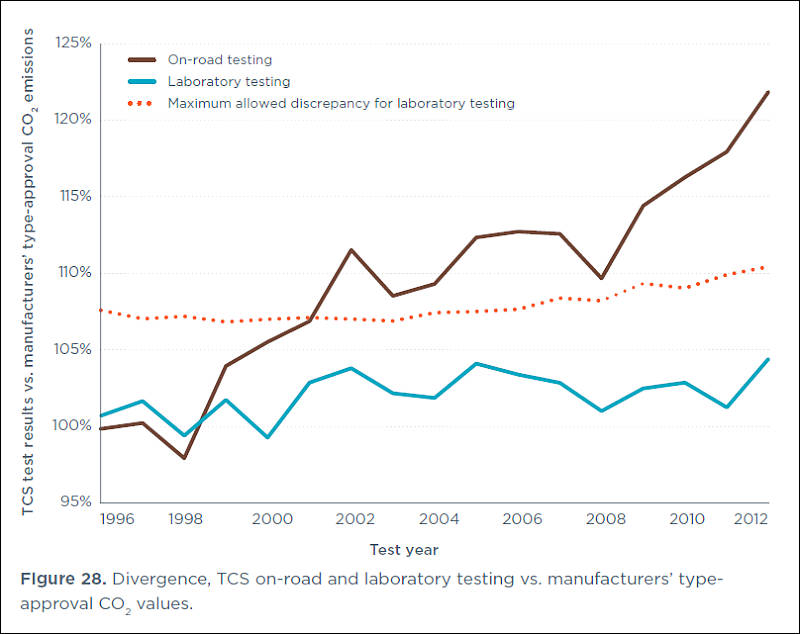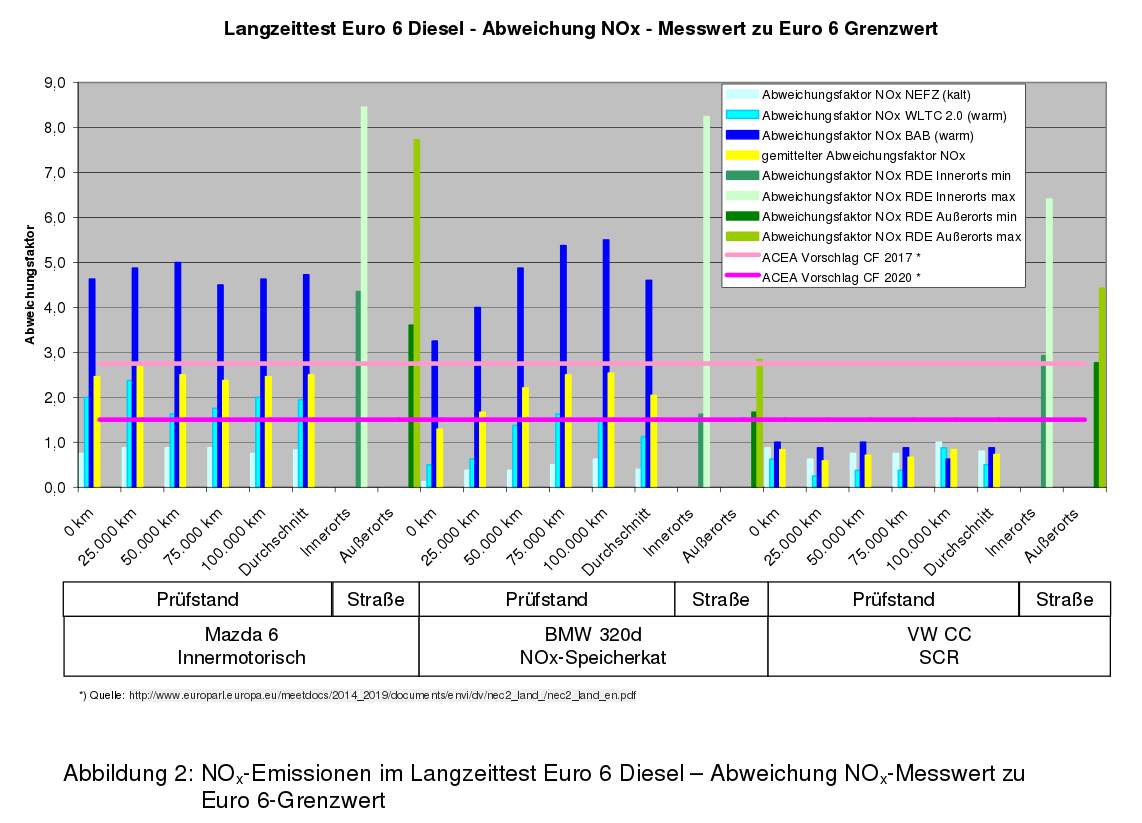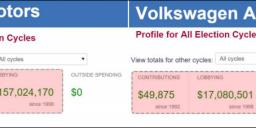
-

The rate of reduction in CO2 emissions from new cars in the European Union increased significantly with the adoption of a mandatory regulation in 2008–2009, from below 2 percent to 4 percent per year. But that regulation applies only to type-approval CO 2 emission values, as measured by the NEDC procedure. To make that progress real, reductions in the level of CO 2 emissions recorded in the laboratory during type-approval testing must match, at least approximately, “real-world” driving conditions.
A technically precise definition of real-world driving conditions is elusive, thanks to variations in vehicle design and in the ways that drivers drive. But by aggregating large sets of on-road driving data, clear trends can be observed. This analysis makes use of several such datasets, for both private and company cars, from various EU member states and Switzerland. It reveals an overarching trend: while the average discrepancy between type-approval and on-road CO 2 emissions was below 10 percent in 2001, by 2011 it had increased to around 25 percent.
http://www.qualenergia.it/sites/default/files/articolo-doc/ICCT_LabToRoad_20130527.pdf
-
And CO2 is not only sin:
When the road load test procedures were drafted 30 years ago, no-one expected carmakers to adjust the brakes, pump up the tyres, and tape up all the cracks around the doors and windows to reduce the air and rolling resistance. These practices are now commonplace, with testing facilities being paid to optimise the results of the tests. There is no evidence that carmakers are breaking any formal rules - but they don’t need to - the current test procedures are so lax there is ample opportunity to massage the test results.
Testing undertaken by an independent laboratory has found that for older vehicles, road load results in realistic tests – e.g. using regular production vehicles - were on average 19% higher than the results obtained in official tests. For more modern vehicles the average difference was 37%, supporting other evidence that the manipulation of the road load part of the test is increasing. These differences would result in around a 12% reduction in measured fuel economy.
Results are also being polished up in laboratory tests by, for example, allowing the battery to discharge during the test; minimizing the weight of the car; using special lubricants that are not supplied with the production vehicle and testing in unrealistically hot temperatures. Once the results have been compiled the current procedure also inexplicably allows the CO2 results declared by the manufacturer to be up to 4% below the measured results.
Independent laboratory tests, using the official drive cycle but with regular production vehicles and without using all the loopholes in the rules, show on average 12% higher fuel consumption and CO2 emissions than official figures reported by the carmaker. In total, the independently executed tests lead to 19-28% (average 23%) higher CO2 emissions and fuel consumption than the official figures reported by carmakers.
-
Seems like big improvement in manipulating test results!
-
Yep, yet media only bite ass of one criminal.
-
Indeed it's a long known fact that car manufacturers cheat like crazy in almost every official emission test. Implementing cheats in firmware might be only ~100 € cheaper per car than putting in an appropriate particle filter, but there's nothing greedy bosses wouldn't do for such extra profit.
Find below three examples of extreme divergence between "official testing" ("Prüfstand") vs. "on road" ("Straße") NOx emissions of some Mazda, BMW and VW, published in an ADAC publication, ADAC did their own tests, and this publication is from April 2015, so really it's not like EPA found something that nobody knew before. I should also mention here that the ADAC is far from being an "environmentalists movement", in fact they are a club of car afficinados, who usually speak out in favor of cars and their manufacturers.

The managers who ordered those cheats probably benefited personally (via higher bonuses) from what they did. They should also personally be sent to jail - instead of just fining some company they might already have left.

 nox.png1142 x 823 - 89K
nox.png1142 x 823 - 89K -
I suggest to send to jail politicians who implemented constantly tight measures openly declaring how easy and cheap is to meet them, same guys forced all people to upgrade making piles of perfectly functions cars.
Proper solution for warm countries was to allow normal family to have single small and simple, modular electric car, and have special car trains for long distance travel.
-
Yes but VK make sure it is clear that a modular ev looks more like a golf cart than a supercar. Form follows function. Function is to get from a to b as fast as possible using little energy. (Bikes or walking probably are better but we also need humans to not use up too much energy either- as some are unable to ride bikes - like babies.).
-
@Vitaliy_Kiselev Since it's the politicians that make the laws, it's unlikely that they will introduce laws that send themselves to jail.
-
Every car owner in my country has known since years that official consumption values are far from real ones. Nobody takes those serious any more, well, maybe just as a relative value, knowing they all cheat. So, even very limited reasoning will tell you that what goes in must go out — at least from a combustion engine. Surprised?
-
In any endeavor where money and prestige are at stake, people will cheat. Witness the situation in cycling, and now in Contract Bridge, where the worlds' top pair has now been accused of sending unauthorized signals by turning cards one way or the other. Until recently, it has been assumed that most competitors were honest. We have now discovered that that assumption will not hold up.
Officials will do almost anything to avoid bad news. This is not a character flaw - it is sound political instinct. It is up to other outside interested agents to point out the problem. That is what happened with the bridge champions, Fantoni and Nunes. Other expert players noticed an astonishingly consistent pattern in how they placed their cards on the table when playing.
If the problem is so bad that everyone cheats, as in cycling, and now, apparently in auto emissions, someone with an impeccable reputation and the resources to do it, such as Consumer Reports, could step up and do it.
-
@4CardsMan sound like a dream world to me. The car industry "owns" enough politicans to make there own rules. And if someone really pisses them off... they will make sure that this person/company/institution won't do that again.
The laws have been changed, so that big companies can win EVERY case, if they are willing to put enough money into it (as long as the other side doesn't have more money).
-
EPA threatened to not certify next year's cars, so VW owned up and will recall the defective cars. Their stock has tanked as a result. This seems to me to be an excellent example of government doing its job.
Besides that, big companies are afraid of negative buzz. An outside testing company with a good reputation can force them to come clean.
-
The laws have been changed, so that big companies can win EVERY case, if they are willing to put enough money into it
Well, laws and courts had been made for them to win most of the cases, as they are just tools made by ruling class :-)
EPA threatened to not certify next year's cars, so VW owned up and will recall the defective cars. Their stock has tanked as a result. This seems to me to be an excellent example of government doing its job
It is not. As it is just some conflict of interest where public media had been used on one side to get from another side something that you do not know (may be even just to behave as everyone else). May be they actually cheated less than industry and everyone hated it.
Besides that, big companies are afraid of negative buzz. An outside testing company with a good reputation can force them to come clean.
Why they are afraid?
-
Volkswagen is embroiled in one of the worst auto industry scandals to date — and it's all thanks to a team of researchers at West Virginia University that have been waiting more than a year for the revelations to go global. The group published their findings in spring 2014 detailing how Volkswagen diesel-powered vehicles were emitting far higher emissions levels in standard driving conditions than during testing cycles required and regulated by the Environmental Protection Agency.
Volkswagen admitted to using so-called "defeat devices," software algorithms that artificially lowered emissions output during testing, to bypass US environmental regulations only after the EPA approached the company with West Virginia University's findings.
Look how carefully media select defect sheep and avoid all else.
-
Comparing GM penalties with threatened VW penalties
General Motors fudged on reporting problems with its ignition system and killed people as a result. The fine, announced last Thursday, was $900 million. Volkswagen fudged on testing its diesel cars for air pollution, killing exactly nobody. The fines being contemplated are well into the billions, in addition to refunds and civil lawsuit penalties for consumers, also running into the billions.
http://www.americanthinker.com/blog/2015/09/comparing_gm_penalties_with_threatened_vw_penalties.html
-
@ Vitaliy_Kiselev - At VW, the stock is down and CEO has resigned. This morning, an article in NY Times suggests that auto makers should have no input in testing. The Guardian reports that France, Germany, and the UK all inhibited truth in emissions testing. It is exactly this kind of publicity that forces corporate change. Now that it is out in the open, this issue will not blow over.
-
At VW, the stock is down and CEO has resigned. This morning, an article in NY Times suggests that auto makers should have no input in testing. The Guardian reports that France, Germany, and the UK all inhibited truth in emissions testing. It is exactly this kind of publicity that forces corporate change.
You mean that NY Times and Guardian (two propaganda newspapers of ruling class) suddenly realized how it is important to humanity?
And that CEO contract non renewal by shareholders (almost same guys who own two newspapers above) presented as "resign" is cool? Or that speculators on stock market who pushed stock one way or another are some good to society?
Of course no, and it will not only repeat in much worse form, but it already happening all across the spectrum.
-

 zebra38.jpg800 x 227 - 32K
zebra38.jpg800 x 227 - 32K -
And that CEO got sacked with more money over every year to come than I'll see in my whole life.
So much for "taking responsibility".
-
I believe the big three US Automakers (GM, Ford, Chrysler) have a history of fighting VW and their diesels being imported into the USA. Something that happened back in the 1980s and the Carter administration. I don't know the specifics. Diesels make up less than 3% of the cars on the road here today. The VW "clean diesel" has been changing that. Some VW dealership reported 30% of their sales are TDIs, others say 20%. The 2015 models looked really good, have the urea emissions controls, and now VW TDI sales are shut down in the US. Just in time to turn off the flow of the 2015 model TDIs that only started to arrive in July of this year.
I am not saying what VW did is right, just that I agree there is a definite political edge to this, that no one is reporting in the USA. Slowly the US media are making the connection that the car companies shouldn't be solely relied upon to do their own emissions reporting. I am sure they are not the only one cheating.
Disclaimer: Owner of a 2002 VW TDI estate car that wasn't subjected to this higher emissions standard of Dieselgate.
-
Actual issue was caused not by management, but by EU/US more and more strict guidelines for car fuel consumption (paired with fuel price increase due to taxes increase) paired with constant reduction of allowable emissions. Problems is - you can not have both.
-
@VK I think another issue is that economic cars are easy to build- but don't have supercharges - or turbos- or sexy styling.
-
I think another issue is that economic cars are easy to build
Economic, real economic cars are very hard to build :-) If you want them to be big and powerful as people used to thanks to ads and propaganda.
I think that this scandal will be later used as one of the reasons to cut car production.
-
A little digging on this issue and I found a 2004 ban on TDI in the US state of Maine: http://www.solarhouse.com/resources/040102diesel.pdf
-
Golf cart meet car! Car meet golf cart...
-
About 2.1 million Audi cars have the software that is at the center of the Volkswagen AG emissions scandal, a spokesman for Audi AG said Monday.
Howdy, Stranger!
It looks like you're new here. If you want to get involved, click one of these buttons!
Categories
- Topics List23,964
- Blog5,723
- General and News1,342
- Hacks and Patches1,151
- ↳ Top Settings33
- ↳ Beginners254
- ↳ Archives402
- ↳ Hacks News and Development56
- Cameras2,361
- ↳ Panasonic990
- ↳ Canon118
- ↳ Sony154
- ↳ Nikon96
- ↳ Pentax and Samsung70
- ↳ Olympus and Fujifilm99
- ↳ Compacts and Camcorders299
- ↳ Smartphones for video97
- ↳ Pro Video Cameras191
- ↳ BlackMagic and other raw cameras121
- Skill1,961
- ↳ Business and distribution66
- ↳ Preparation, scripts and legal38
- ↳ Art149
- ↳ Import, Convert, Exporting291
- ↳ Editors191
- ↳ Effects and stunts115
- ↳ Color grading197
- ↳ Sound and Music280
- ↳ Lighting96
- ↳ Software and storage tips267
- Gear5,414
- ↳ Filters, Adapters, Matte boxes344
- ↳ Lenses1,579
- ↳ Follow focus and gears93
- ↳ Sound498
- ↳ Lighting gear314
- ↳ Camera movement230
- ↳ Gimbals and copters302
- ↳ Rigs and related stuff272
- ↳ Power solutions83
- ↳ Monitors and viewfinders339
- ↳ Tripods and fluid heads139
- ↳ Storage286
- ↳ Computers and studio gear560
- ↳ VR and 3D248
- Showcase1,859
- Marketplace2,834
- Offtopic1,319









